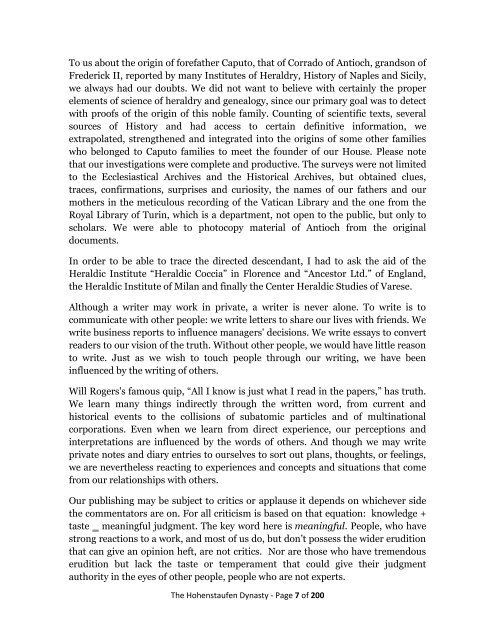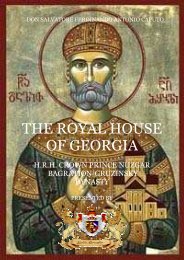here - Nobility Associations
here - Nobility Associations
here - Nobility Associations
Create successful ePaper yourself
Turn your PDF publications into a flip-book with our unique Google optimized e-Paper software.
To us about the origin of forefather Caputo, that of Corrado of Antioch, grandson of<br />
Frederick II, reported by many Institutes of Heraldry, History of Naples and Sicily,<br />
we always had our doubts. We did not want to believe with certainly the proper<br />
elements of science of heraldry and genealogy, since our primary goal was to detect<br />
with proofs of the origin of this noble family. Counting of scientific texts, several<br />
sources of History and had access to certain definitive information, we<br />
extrapolated, strengthened and integrated into the origins of some other families<br />
who belonged to Caputo families to meet the founder of our House. Please note<br />
that our investigations were complete and productive. The surveys were not limited<br />
to the Ecclesiastical Archives and the Historical Archives, but obtained clues,<br />
traces, confirmations, surprises and curiosity, the names of our fathers and our<br />
mothers in the meticulous recording of the Vatican Library and the one from the<br />
Royal Library of Turin, which is a department, not open to the public, but only to<br />
scholars. We were able to photocopy material of Antioch from the original<br />
documents.<br />
In order to be able to trace the directed descendant, I had to ask the aid of the<br />
Heraldic Institute “Heraldic Coccia” in Florence and “Ancestor Ltd.” of England,<br />
the Heraldic Institute of Milan and finally the Center Heraldic Studies of Varese.<br />
Although a writer may work in private, a writer is never alone. To write is to<br />
communicate with other people: we write letters to share our lives with friends. We<br />
write business reports to influence managers' decisions. We write essays to convert<br />
readers to our vision of the truth. Without other people, we would have little reason<br />
to write. Just as we wish to touch people through our writing, we have been<br />
influenced by the writing of others.<br />
Will Rogers's famous quip, “All I know is just what I read in the papers,” has truth.<br />
We learn many things indirectly through the written word, from current and<br />
historical events to the collisions of subatomic particles and of multinational<br />
corporations. Even when we learn from direct experience, our perceptions and<br />
interpretations are influenced by the words of others. And though we may write<br />
private notes and diary entries to ourselves to sort out plans, thoughts, or feelings,<br />
we are nevertheless reacting to experiences and concepts and situations that come<br />
from our relationships with others.<br />
Our publishing may be subject to critics or applause it depends on whichever side<br />
the commentators are on. For all criticism is based on that equation: knowledge +<br />
taste ‗ meaningful judgment. The key word <strong>here</strong> is meaningful. People, who have<br />
strong reactions to a work, and most of us do, but don’t possess the wider erudition<br />
that can give an opinion heft, are not critics. Nor are those who have tremendous<br />
erudition but lack the taste or temperament that could give their judgment<br />
authority in the eyes of other people, people who are not experts.<br />
The Hohenstaufen Dynasty - Page 7 of 200



